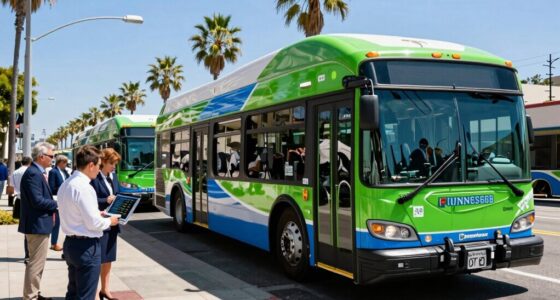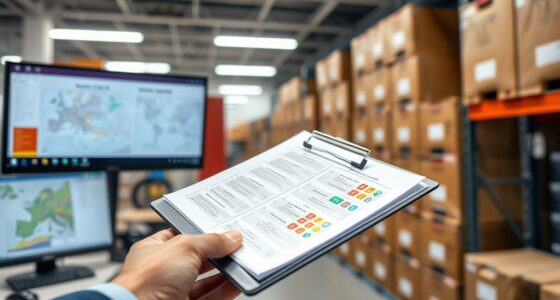When exporting vans with specialized equipment, you need to follow strict export controls to stay compliant with national security laws and international regulations. This involves identifying controlled items, obtaining necessary licenses, and maintaining detailed records of your shipments. Export controls help prevent sensitive technology from reaching unauthorized destinations and protect your company’s reputation. If you want to understand specific requirements and best practices, there’s more to explore on how to stay fully compliant and secure your exports.
Key Takeaways
- Determine if the specialized equipment in the van is classified as controlled under national or international export control lists.
- Obtain necessary export licenses before shipping vans equipped with dual-use or military-grade technology.
- Maintain detailed records of all export documentation, including licenses, technical descriptions, and shipment details.
- Ensure compliance with evolving export regulations through staff training and consultation with legal or export compliance experts.
- Verify destination country restrictions to prevent illegal export of sensitive equipment and avoid penalties.

Export controls for vans equipped with specialized equipment are essential to guarantee national security and compliance with international regulations. When you deal with such vehicles, you must understand that these controls are designed to prevent sensitive technology and equipment from falling into the wrong hands. This isn’t just about following laws; it’s about safeguarding your country’s interests, protecting critical infrastructure, and maintaining diplomatic relations.
Specialized equipment in vans—like advanced communication systems, surveillance tools, or military-grade hardware—can have dual uses, meaning they can serve civilian purposes but also be exploited for military or intelligence activities. Because of this, governments impose strict export restrictions, requiring you to navigate complex compliance procedures before shipping.
You’ll need to be aware of the classification systems used to determine whether your van or its components fall under export control regulations. These classifications are typically based on international agreements like the Wassenaar Arrangement or national export control lists. If your vehicle contains items listed as controlled, you’re responsible for obtaining the necessary licenses or authorizations before export.
Failing to do so can lead to severe penalties, including hefty fines, criminal charges, and damage to your reputation. To guarantee compliance, you should thoroughly review the export control lists, identify the specific items or equipment, and determine the licensing requirements. Additionally, understanding the difference between Penetration Testing and Ethical Hacking can help ensure that your security measures and compliance efforts are aligned with best practices in cybersecurity.
It’s also essential to keep detailed records of all export transactions involving vans with specialized equipment. This includes documentation like licenses, shipping papers, technical descriptions, and correspondence with authorities. Maintaining accurate records not only helps you stay compliant but also provides a clear audit trail should your exports come under review.
Additionally, staying updated on changing regulations is critical because export controls evolve in response to geopolitical shifts, technological advancements, and international agreements. Regularly consulting with legal experts or export compliance specialists can help you adapt your processes accordingly.
Furthermore, you should implement internal procedures to verify that each shipment complies with all applicable controls. This might involve training staff, conducting internal audits, or using compliance software. Remember, export controls aren’t just bureaucratic hurdles—they’re safeguards designed to prevent misuse of sensitive technology.
Frequently Asked Questions
Are There Specific Licenses Required for Exporting Specialized Van Equipment?
Yes, you need specific licenses to export specialized van equipment. You should check the U.S. Department of Commerce’s Bureau of Industry and Security (BIS) for Export Control Classification Numbers (ECCNs) that apply.
If your equipment is controlled, you’ll likely require a license before shipping. Make sure to review the Export Administration Regulations (EAR) to determine licensing requirements and avoid penalties or shipment delays.
How Do Export Controls Differ Between Domestic and International Shipments?
Export controls differ markedly between domestic and international shipments.
For domestic shipments, you mainly follow local regulations and guarantee compliance with national laws.
However, when shipping internationally, you must navigate complex export controls, obtain necessary licenses, and adhere to international trade agreements.
You should check specific country requirements and restrictions, as violations can lead to hefty fines and legal issues.
Always verify regulations before proceeding with cross-border shipments.
What Penalties Exist for Non-Compliance With Export Regulations?
If you don’t comply with export regulations, you could face hefty fines, license revocations, or even criminal charges. Customs authorities can seize your shipments, and you might be barred from exporting in the future.
Penalties depend on the severity of the violation, but ignoring export controls risks significant legal consequences. To avoid this, make certain you understand and follow all applicable regulations and maintain proper documentation for your shipments.
Can I Export Vans With Specialized Equipment to Embargoed Countries?
Did you know that violations of export controls can lead to fines up to $1 million? You generally can’t export vans with specialized equipment to embargoed countries without proper authorization.
Doing so risks serious legal consequences, including fines, imprisonment, and loss of export privileges. Always check the latest embargo lists and obtain necessary licenses before attempting an export.
When in doubt, consult with export compliance experts to avoid costly mistakes.
Are There Exemptions for Certain Types of Specialized Van Equipment?
Yes, there are exemptions for certain types of specialized van equipment. You might qualify if the equipment is intended for personal use, humanitarian aid, or if it falls under specific license exceptions.
However, you need to carefully review the applicable export regulations and consult with export control authorities to confirm your equipment qualifies. Always verify whether your equipment meets the criteria for exemption before proceeding with any export plans.
Conclusion
Guiding export controls may seem like a maze, but understanding the rules keeps your path clear. By staying informed about regulations for vans with specialized equipment, you safeguard your business and make certain smooth international trade. Think of these controls as the compass guiding your journey—without them, you risk getting lost in a sea of red tape. Stay vigilant, stay compliant, and let these rules be the steady anchor that keeps your export voyage on course.









